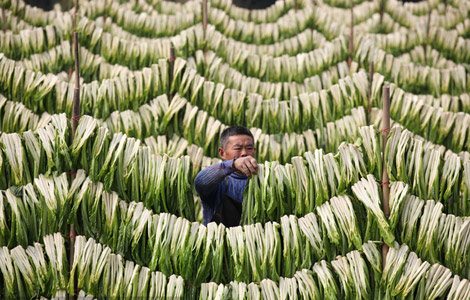Canadian agri-food aim at growing Chinese market
Updated: 2015-01-29 06:02
By Wang Ru in Beijing(China Daily CANADA)
|
||||||||
|
 |
|
Ambassador Guy Saint-Jacques (right) joined in the Canadian agri-food promotion event on Tuesday at the Canadian Embassy in Beijing. Wang Ru/ China Daily |
A Canadian food promotion event was held on Tuesday at the Canadian embassy in Beijing, attracting food exporters, media and gourmets.
Canadian Ambassador Guy Saint-Jacques hosted the event and joined with wine and food experts to introduce the popular wines and food products from Canada such as the well-known ice wine, lobster and beef.
As the trade ties between China and Canada continue to be enhanced, agricultural products from Canada, usually recognized as safe, clean and natural, are aiming at the growing market in China.
The event is a part of a series events named "Eat Drink Canada China" created by the Canadian embassy in China. It was sponsored by Canadian agri-food producers such as the Canadian Beef International Association and the Canadian Prawn Producers Association and served to promote Canadian products in China.
"Whether it is beef or lobster, berries or maple syrup, table wines or ice wines – Canadian food and wine products reflect our country’s dedication to excellence, and our deep and abiding commitment to safety, quality and environmental responsibility," said Saint-Jacques.
The survey released by Insight China Magazine and Tsinghua University in 2014 indicated that food safety remained the most concerning issue in Chinese society. Fifty-three percent of interviewees in the survey were unsatisfied with the safety of food in China.
"Canada has top quality food products and very strict food safety control system, both of which can be introduced to China," said Yuan Zhanling, a retired Chinese trade counselor to Canada.
"Canada has sufficient and high-quality agri-food product to export, but are not promoted enough in Chinese market, and there are fake products in China too," said Yuan, who is now a senior consultant of the Canada Asia Business Network.
Canada is a world leader and renowned for being a reliable source of high-quality, safe agricultural, food, seafood and beverage products. The county’s climate, geography and environment provide a natural advantage for safe food and drinks production, including abundant clean water and land resources, a cold climate that inhibits pests and diseases, and a winter season that enables natural resting period for soils.
Also, Canada is a global leader in food safety – rigorous Canadian laws and regulations provide world-class production standards for our food, seafood and agriculture industries, and many sectoral standards even exceed international standards to enhance Canada’s advantage.
Canada is the world's fifth largest agriculture and agri-food exporter. In fact, Canada exports about 45 percent of the domestic food and agricultural products to more than 180 countries globally, with China being the second largest market.
Last November, in a state visit to China, Canadian Prime Minister Stephen Harper and Chinese
Premier Li Keqiang sealed an agreement to clear the way for Canadian cherries to enter China, which Chinese consumers will be able to enjoy soon.
During his China visit, Harper also met with Alibaba founder and executive chairman, Jack Ma, where they discussed how Canadian businesses can leverage e-commerce platforms like Alibaba to grow their businesses internationally.
"Mr. Ma told the Prime Minister that he hoped to promote Canadian lobsters in China through his Alibaba platform," said Saint-Jacques.
In 2013, Canada was the sixth-largest supplier of fish and seafood to China, with sales of $405.4 million (based on Chinese import data) – an increase of 16.2 percent over 2012. The leading Canadian products imported included frozen crab, frozen cold-water shrimp, fresh crab and lobster.
China was Canada’s second-most important destination for fish and seafood, and received about 10.3 percent of Canada's overall seafood exports in 2013. In fact, fish and seafood were Canada’s third most significant export sector to China, and represented 7.9 percent of all Canadian products exported to China in 2013, according to Global Trade Atlas, 2014).
Canada is recognized as the world’s premier flagship producer of ice wine, which has become an International success story and the country’s calling card. It is the largest ice wine producer in the world, with 96 wineries across Canada producing the product in the highly regulated, globally accepted, traditional method.
Today, China is Canada’s number one country of export, with $8.1 million of ice wine exported in 2013, representing about 46% of all Canadian ice wine exports.
wangru@chinadaily.com.cn

 Old photos of China's military parade
Old photos of China's military parade
 'Polar bear' roams in London, but don't panic
'Polar bear' roams in London, but don't panic
 The ancient practice of preserving and drying food
The ancient practice of preserving and drying food
 Seniors enjoy swimming despite the chill
Seniors enjoy swimming despite the chill
 Snow job
Snow job
 US, China expected to lead on climate talks
US, China expected to lead on climate talks
 Weighing in on justice in China
Weighing in on justice in China
 Northeastern US braces for 'crippling' blizzard
Northeastern US braces for 'crippling' blizzard
Most Viewed
Editor's Picks

|

|

|

|

|

|
Today's Top News
US, China expected to lead on climate talks
Weighing in on justice in China
China wants US to help build trust on maritime disputes
Yahoo to spin off Alibaba shares
China opens market to all US apples
Parade will commemorate victory over Fascism
Expatriates to be lured for startups
Beijing gears up for Super Bowl
US Weekly

|

|







